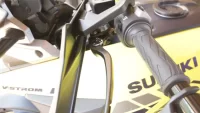
Troubleshooting a Stiff Motorcycle Clutch Lever: 13 Potential Causes and Detailed Fixes
Operating a motorcycle's clutch lever should be smooth and effortless. When it starts to feel stiff or resistant, it's essential to identify the underlying issue.
Below, we delve into 13 specific causes of a hard-to-pull clutch lever and offer detailed solutions for each scenario.
1.) Dirty or Damaged Clutch Cable:
Issue: Accumulated dirt and damage within the cable housing hinder smooth movement.
Solution: Inspect for cable damage and thoroughly clean. Lubricate using a cable lubrication tool to restore proper function.
2.) Clutch Cable Obstruction:
Issue: The cable might be snagging or pinched along its route, impeding free movement.
Solution: Conduct a visual inspection along the cable's path. Reroute if necessary to ensure unobstructed motion.
3.) Excessive Clutch Cable Tension:
Issue: Over-tightened cable creates unnecessary pressure on clutch return springs, leading to a stiffer lever.
Solution: Adjust the cable tension at the lever for the recommended 3-4 mm of free play.
4.) Maintenance of Clutch Lever Pivot Point:
Issue: A dirty, rusted, or overly tight pivot point restricts lever movement.
Solution: Clean the pivot point thoroughly with soap and water, and lubricate it with WD40. If corroded, consider replacement.
5.) Improper Clutch Lever Adjustment:
Issue: Incorrect lever positioning can make clutch operation more strenuous.
Solution: If adjustable, set the lever to a comfortable position for two-finger operation.
6.) Clutch Actuator Issues:
Issue: Damaged or corroded actuator arms impede movement.
Solution: Inspect the actuator arm and pushrod for damage. Seek professional assistance for replacement or thorough cleaning.
7.) Stiff Clutch Springs:
Issue: Heavy-duty springs increase resistance at the lever.
Solution: Consider installing appropriately rated springs or explore aftermarket hydraulic clutch options.
8.) Damage to Clutch Plates or Basket:
Issue: Although rare, damage to clutch components can cause binding.
Solution: Open the clutch cover, inspect the friction plates, and replace if necessary.
9.) Low Transmission Oil Level:
Issue: Wet clutches require sufficient oil for optimal function.
Solution: Ensure proper oil levels in both the engine and transmission.
10.) Clutch Lever Length and Condition:
Issue: A broken or short lever reduces leverage, making it harder to pull.
Solution: Replace the lever if damaged. Consider installing an aftermarket lever for improved ergonomics.
11.) Clutch Lever Positioning:
Issue: Incorrect positioning strains the wrist and forearm.
Solution: Adjust the lever's position on the handlebars for a natural wrist alignment.
12.) Sticking Master or Slave Cylinder:
Issue: In hydraulic systems, binding in the cylinders can increase resistance.
Solution: Consider professional maintenance or cylinder replacement if necessary.
13.) Weak Hand and Wrist Muscles:
Issue: In some cases, the problem may be weak hand muscles.
Solution: Strengthen hand and arm muscles through targeted exercises and grip strengtheners.
Conclusion:
A well-functioning clutch lever is crucial for a smooth and safe riding experience. By meticulously troubleshooting potential issues and applying the corresponding solutions, riders can ensure their motorcycle's clutch operation remains efficient and comfortable. Remember, routine maintenance and proper adjustments are key to preserving the longevity and performance of your clutch system.
Article Credits: Adventure Bike Troop
.png.f357c4bbda45b8d1f0301390a48a7ff4.png)



.thumb.jpg.942d9c8d2090d78b3319f3cc3d3744e6.jpg)







.jpg.235fc6803b3f382b3d575961f526a91d.jpg)


Recommended Comments
There are no comments to display.
Join the conversation
You can post now and register later. If you have an account, sign in now to post with your account.